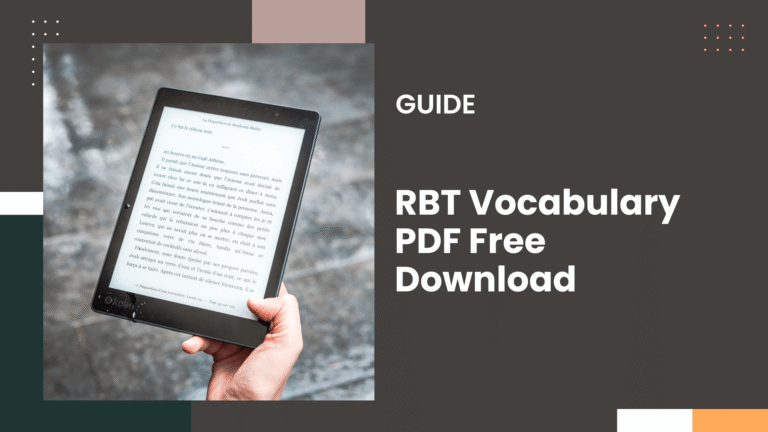What Exam to Take After Getting Your RBT Certification | My Personal Experience

The exam to take after getting your RBT certification is the BCaBA (bachelor’s degree, 500–1,000 hours) or BCBA (master’s degree, 2,000 hours). Both advance your ABA career with higher responsibilities and pay.
So, you’ve nailed your RBT certification, big step, congrats.
I remember when I passed mine back in 2019. It felt huge at the time, but within a few months of working as an RBT, I started thinking: What’s next?
A lot of RBTs hit this point. You’ve mastered behavior tech work, but the field has higher levels you can move up to, and those come with better pay and bigger responsibilities.
Here’s exactly what comes after RBT, straight from my own experience and what I’ve seen on Reddit and in ABA circles.
Two Main Exams After RBT
If you’re looking to move up after being an RBT, you’ll be aiming for either:
1. BCaBA (Board Certified Assistant Behavior Analyst)
- Eligibility:
- Bachelor’s degree in behavior analysis, education, or a related field
- Approved ABA coursework (about 225 classroom hours)
- Supervised fieldwork: 500–1,000 hours (depends on supervision structure)
- Exam: 160 multiple-choice questions
- Cost: Around $245 for the application and $125 for the exam fee
- Passing Rate: Roughly 62% in 2023, based on BACB data
- Role: Mid-level ABA position. You can do more assessments and program development than an RBT, but still work under a BCBA.
- Personal Take: I almost jumped straight into this path. One of my coworkers did and said it added about $6–8/hour to their pay in under two years.
2. BCBA (Board Certified Behavior Analyst)
- Eligibility:
- Master’s degree in behavior analysis, education, or psychology
- 315+ classroom hours of approved coursework
- 2,000 hours of supervised fieldwork
- Exam: 185 multiple-choice questions
- Cost: $245 application + $125 exam
- Passing Rate: About 65% in 2023
- Role: This is the big one—full autonomy in designing and overseeing behavior programs. You can supervise RBTs and BCaBAs.
- Personal Note: A former teammate of mine went straight from RBT to BCBA in four years and doubled their salary.
I remember thinking, That’s the long game, but it’s worth it.
| Level | Degree Needed | Fieldwork Hours | Avg. Pay Increase |
|---|---|---|---|
| BCaBA | Bachelor’s | 500–1,000 | +$6–$8/hour |
| BCBA | Master’s | 2,000 | +$20+/hour |
How I Decided Which One to Go For?
When I first looked into it, I was overwhelmed. I was searching on Reddit threads that were full of debates, some saying to stop at BCaBA, others pushing straight to BCBA.
From experience, here’s what I learned:
- BCaBA is great if: You want to level up fast, handle assessments, and earn more without the time and cost of a Master’s.
- BCBA is better if: You’re in it for the long haul, aiming for leadership roles or private practice.
I started by shadowing my clinic’s BCBA.
I saw the workload, the decision-making power, and the impact they had on treatment plans. That’s when I knew BCBA was my end goal.
My Personal Experience
I once posted in an ABA subreddit asking if BCaBA was worth it first.
A dozen people replied, saying, “Skip BCaBA and save your time.” But one person shared they did BCaBA first, got promoted quickly, and had their employer pay for their Master’s later.
That comment stuck with me.
A year later, I had the same experience, after I got BCaBA, my clinic offered to cover 75% of my Master’s tuition.
That’s how I’m now on track for BCBA without crushing student debt.
What are the Steps to Move Beyond RBT?
If you’re considering your next move:
- Check your degree:
- If you have a Bachelor’s, BCaBA can be done in about 12–18 months.
- If you’re already in a Master’s program, aim for BCBA.
- Pick a verified course sequence (search “BACB VCS”) to ensure eligibility.
- Find supervised fieldwork — clinics, schools, or agencies often provide it.
- Start early: Fieldwork hours take a while. I logged mine over the weekends to finish faster.
- Save for fees: Applications and exams add up (expect $500–$600 total).
From One RBT to Another, What’s My Expert Advice?
Well, if you’ve already got your RBT, the next exam depends on your degree and long-term goals.
BCaBA gets you a pay bump and more responsibility faster, while BCBA sets you up for top-tier roles and salaries.
From my own path and talking to countless RBTs online and in real life:
- If you want to test the waters and move up gradually, BCaBA first.
- If you’re ready to commit to leadership in ABA, then BCBA is worth the grind.
For me, I’d make the same choice again, start with BCaBA, let your employer help with your Master’s, and then crush the BCBA exam.
Can you go from RBT to BCBA directly?
Yes, but you’ll need a master’s degree in behavior analysis or a related field and 2,000 supervised hours before taking the BCBA exam. Many RBTs first gain experience and complete fieldwork requirements while working.
Is BCaBA required before becoming a BCBA?
No. You can skip BCaBA and directly pursue BCBA if you meet the education and fieldwork requirements. BCaBA is an optional intermediate credential for those with a bachelor’s degree.
How much more do BCaBAs and BCBAs make than RBTs?
On average, BCaBAs earn $45,000–$60,000/year, while BCBAs earn $70,000–$90,000/year. RBTs typically make $35,000–$50,000/year, depending on experience and location.
Whichever choice you make after your RBT Exam, I’m sure you will crush it, and let me know which one you go for in the comments below!






